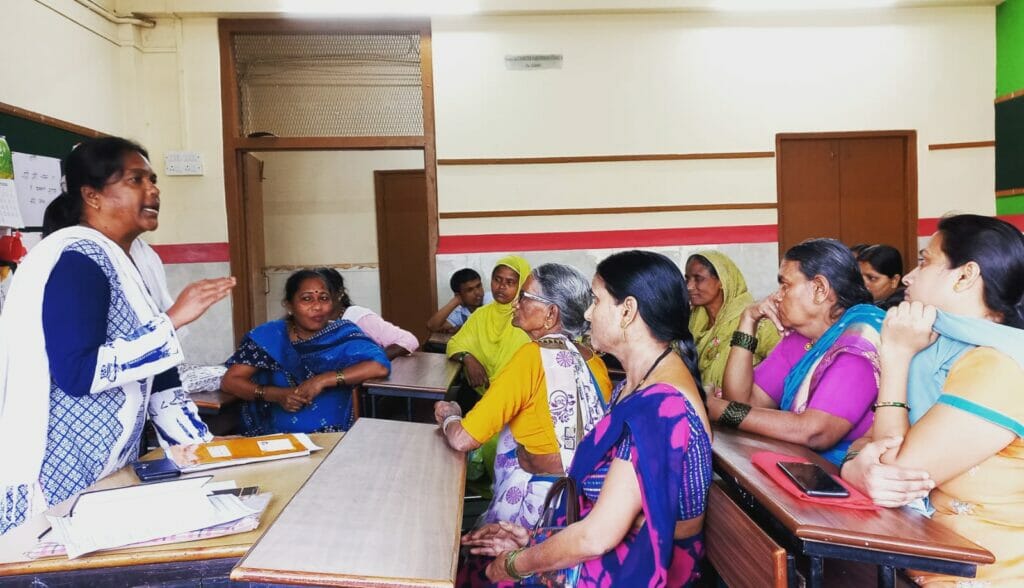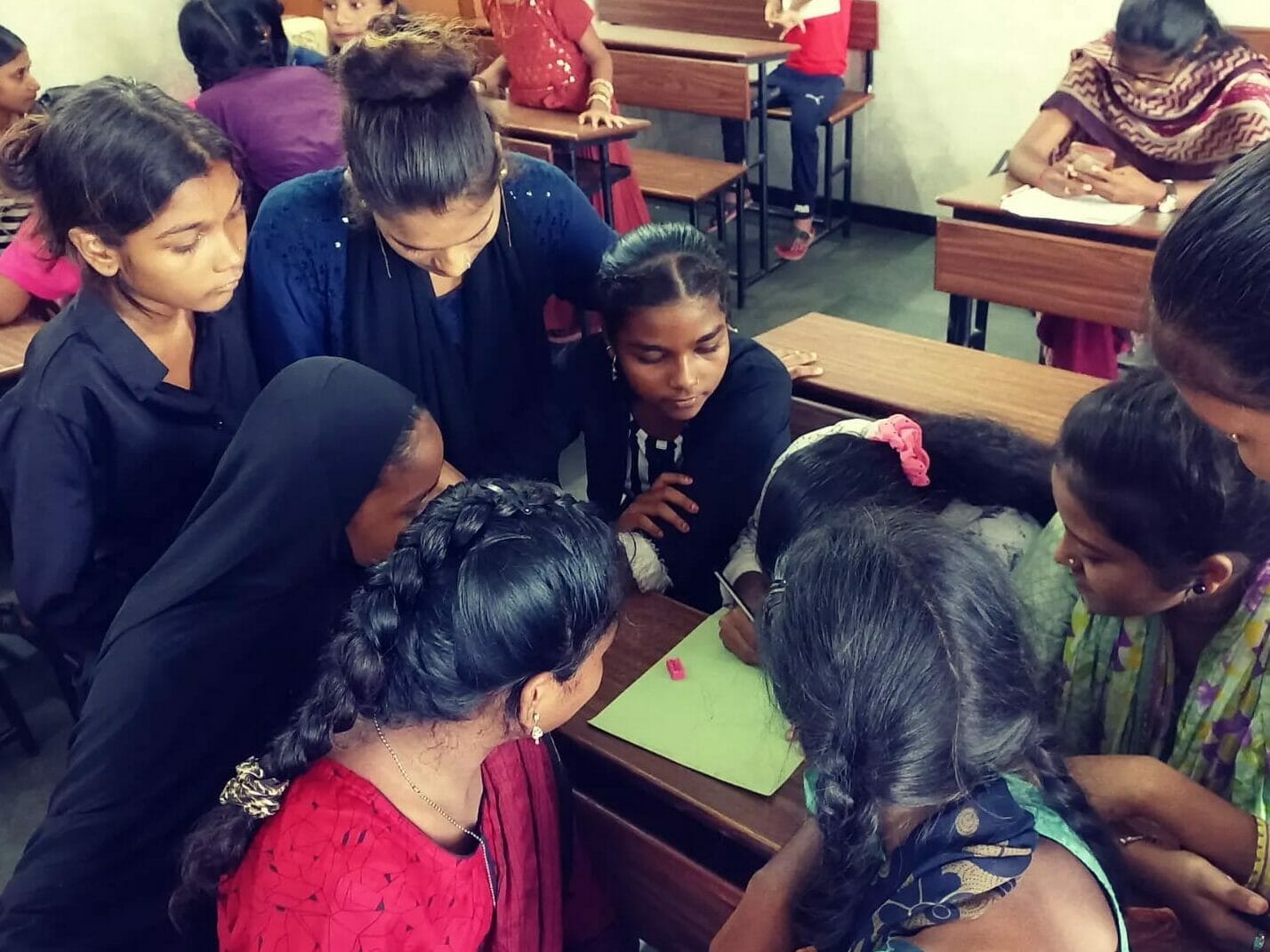On the bylanes of Dockyard Road leading to Reay Road, lies a ‘basti’ popularly known as Darukhana. Its occupants are migrant families from states of northern India and occasionally some Maharashtrian families. This ‘basti’ or informal settlement, has approximately 7000 huts, which are small in size and occupied by large families.
There is a glaring lack of basic amenities, and most families do not possess basic documents due to migration and the informal nature of their work. While the elders make their living by doing odd jobs at the local fish jetty or in small scale industries and the unorganised labour sector, the children are enrolled in municipal run schools. Many children risk dropping out of school to join their parents in earning a living.
These children are exposed to an unhealthy environment and witness abuse, crimes, domestic violence and gambling on a daily basis. Many boys take up alcoholism and drug abuse, following in the footsteps of the older men in the area. Most girls are not encouraged to continue their education.
Since its inception in 1996, Vimla Vikas Kendra (VVK), a community centre has been attending to the educational needs of these students. Besides, we also work in areas of women empowerment, health and hygiene.
When the bastis are demolished
Demolition is the shadow that looms large. It is not a question of if the basti is demolished rather when will a basti be demolished. To receive rehabilitation, one needs to possess the following documents; electricity bill before 2000, voter id, and ghar pauti. Many families from the basti at Darukhana do not possess the documents and are at the risk of complete displacement.
VVK has intervened by providing the required legal assistance through documentation and assisting in the collection and mobilisation of the documents.
The demolition will have an adverse effect on the children’s education.
When the government fails to provide basic amenities to its citizens, centres such as ours have to step in. While the bastis have been our core focus since inception, we will have to repurpose our programmes once the bastis are demolished. But at present we are doing everything in our capacity to ensure basic rights of education and rehabilitation for these citizens before they lose their houses.
Focus on growth and self-sustenance
Every evening, from Monday to Friday, at around 6:00pm students from this ‘basti’ gather to study. A social worker, a few volunteer teachers, and volunteers from nearby colleges facilitate these classes. This is hugely beneficial for students of Class 9 and Class 10 whose families cannot afford tuition fees. To make learning more holistic, there are annual days, summer camps, daily supplementary nutrition and picnics.
In order that women from the community are self-sufficient and do not have to depend on their male counterparts, there are vocational certificate courses like tailoring, beautician, spoken english, computers, mehendi. Workshops are conducted to help women with savings, knowing their rights, and menstrual health. We have also been helping with legal documentation.

Our most recent programmes were the menstrual health workshop for adolescent girls, and an awareness session on parkinsons, dementia and stroke for senior citizens. An awareness session about bank schemes and saving strategies was conducted for women enrolled at the centre.
Through these sessions and programmes our beneficiaries become more aware. The various ‘taboos’ that affect their thinking and lifestyle are diluted so that they begin to realise their worth as well as their rights.
We also address issues concerning their basic amenities, for example, scarcity of water, problems in availing rations and family problems. We network with BMC officials and local authorities to solve such issues.
Read More: Six million in Mumbai’s slums are on the frontline of climate risk
Testimonies from students
Akash, a 12th grader, shared his experiences of being with VVK. Initially, he was afraid that he wouldn’t fit in. He has been a part of the centre since Grade 1. Today 12 years later, he is unafraid to express himself. From a shy child, who was scared of not fitting in, to a young adult bubbling enthusiasm and confidence, he has come a long way forward. VVK has helped nurture his dreams and has provided him with a conducive environment to pursue his education, with the required support, and the determination to succeed.

Another boy, Nadeem, a 10th grader, has been a student for 8 years. Both of his elder siblings Nasreen and Rehan were students at the centre. He expressed the impact of having a community that believed in him. He is immensely grateful for the timely financial support when his family was going through a crisis at the loss of his father. Nadeem is a topper in his class at school and he dreams of becoming an engineer someday.
Service, strength, and solidarity
Vimla Vikas Kendra began as a social work collaboration with the Parish of Rosary Church Dockyard and the congregation of ‘The Sisters of Charity of Nazareth’. Keeping the theme ‘Service to the poor, marginalised and downtrodden’ in mind, they visited families in the neighbourhood and pavement dwellers of Dockyard Road. They committed to educating them. The organisation was formally conceived as a community centre on August 15, 1996.
Right from its origin, the target group has remained the pavement dwellers, the unorganised labour sector, from the areas along P D’mello Road, from Wadi Bunder, Dockyard Road, Darukhana and a section of Reay Road.
Vimla Vikas Kendra has social workers from nearby localities and volunteers of all age groups to help. The organisation welcomes citizens who might need help or those who would like to volunteer. We can be reached at 9867679056 or vimlavikask@gmail.com.